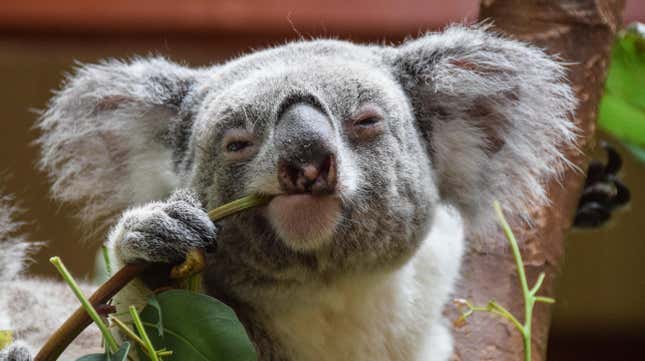
Scientists in Australia have just begun an ambitious public health campaign, but not for humans. As part of a new field trial, koalas in the wild are being temporarily captured and then vaccinated against chlamydia, which can be dangerous and even life-threatening for them. The hope is that the vaccine can help reverse the population decline of these now-endangered marsupials.
Chlamydia is named after the several species of bacteria that cause it, which vary from animal to animal. It’s a major problem in humans, being one of the most commonly contracted sexually transmitted infections in the world. Left untreated, human chlamydia can cause permanent infertility and raise the risk of catching other STIs. But the disease is even worse in koalas. In these animals, it can be outright deadly or cause serious complications like permanent bladder damage, infertility, and blindness.
Koalas haven’t had an easy time lately, as their numbers have steadily declined. Last year, the Australian government officially declared them an endangered species in two states. Much of this population crunch has been attributed to recent natural disasters, such as wildfires and droughts, but chlamydia hasn’t helped. In some areas, as many as 50% of koalas are thought to be infected with the bacteria. The bacteria is often sexually transmitted between adult koalas, but it can be spread from mother to children as well (for a brief time, baby koalas will eat a special form of their mother’s poop, called pap).
Antibiotics can successfully treat chlamydia in both humans and koalas, but they’re not a practical solution for the latter. It would be difficult to effectively reach and treat infected koalas on a large scale the way we can with humans. And even if we could, antibiotics can disturb the gut microbiome of koalas, which they rely on to eat eucalyptus leaves, their primary source of food.
For over a decade, scientists at the University of the Sunshine Coast (USC) in Queensland, Australia have been working on a more feasible workaround: a koala chlamydia vaccine. In 2021, they started a phase III trial meant to vaccinate up to 400 koalas. And they’ve since embarked on the next part of their research.
“It’s killing koalas because they become so sick they can’t climb trees to get food, or escape predators, and females can become infertile,” vaccine developer Samuel Phillips, a microbiologist at the University of the Sunshine Coast, told the AP Tuesday.
The earlier trial was designed to vaccinate hundreds of koalas that were admitted to local wildlife hospitals for other reasons. But the scientists have now started to capture wild koalas for the express purpose of vaccinating them. The koalas are said to be humanely trapped, vaccinated while under anesthesia, then monitored for 24 hours before being released back into the wild. They’re also marked with pink dye to confirm their vaccination status.
According to the AP, the very first wild koalas in this trial were caught and vaccinated in March. The team ultimately plans to vaccinate up to half of the koala population in the Northern Rivers region of New South Wales, or around 50 in total.
“We want to evaluate what percentage of the koalas we need to vaccinate to meaningfully reduce infection and disease,” Phillips said.
Should this trial and other research pan out, the team hopes to secure approval for the vaccine in the near future. They’ve recently secured additional funding to develop an industry-grade version of the vaccine and to run further trials.